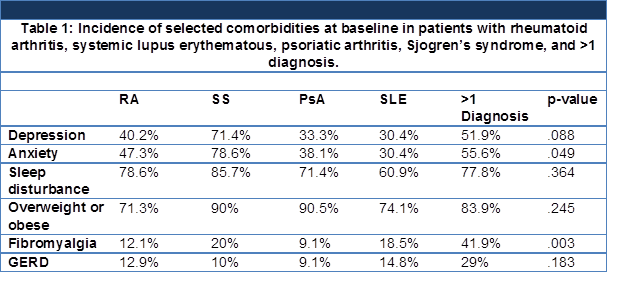Session Information
Date: Tuesday, November 10, 2015
Title: Fibromyalgia, Soft Tissue Disorders, Regional and Specific Clinical Pain Syndromes Poster II
Session Type: ACR Poster Session C
Session Time: 9:00AM-11:00AM
Background/Purpose: Patients with rheumatic diseases often have comorbidities that complicate their psychological well-being and affect prognosis. In this study, we looked at 216 patients with rheumatoid arthritis (RA), systemic lupus erythematous (SLE), psoriatic arthritis (PsA), or Sjogren’s syndrome (SS) to determine (a) the prevalence of anxiety, depression, sleep disturbance, fibromyalgia (FMS), BMI greater than 23, and gastroesophageal disease (GERD) in each patient population (b) the relationship between FMS, BMI, disease activity measure known as RAPID3.
Methods: Study participants were 216 rheumatology patients seen at the UCF Pegasus Health clinic from November 2011 to May 2014 with one or more of the following diseases: rheumatoid arthritis (n=116), Sjogren’s syndrome (n=20), SLE (n=27), or psoriatic arthritis (n=22). 28 were male and 88 were female. Variables that were collected included RAPID3 scores, patient demographics (age, sex), BMI, presence of GERD, and presence of FMS. Each patient was randomly assigned, unique and unidentifiable study number.
Results: Significant differences in the prevalence of anxiety and fibromyalgia were found in the study populations, with anxiety being more prevalent in Sjogren’s syndrome, and fibromyalgia being more prevalent in patients with >1 diagnosis. The presence of fibromyalgia was significantly correlated with RAPID3 score in all patients except those with PsA. Significant correlations between BMI and RAPID3 score were found for patients with rheumatoid arthritis and for patients with Sjogren’s syndrome who demonstrated the most pronounced relationship.
Conclusion: Our study confirmed the increased prevalence of anxiety in patients with Sjogren’s syndrome. Evaluation and treatment for comorbid psychiatric conditions may be pertinent in these patients. Fibromyalgia was confirmed to be related to disease activity scores. Clinically, this may incorrectly be perceived as worsening of rheumatic disease. In RA and SS patients, BMI was significantly correlated with RAPID3 scores. Studies confirm that obesity in RA patients reduces rates of remission and response to treatment.
To cite this abstract in AMA style:
Bég S, Ahmad A. Relationship Between Anxiety, Depression, Sleep, Fibromyalgia and BMI in Patients with Rheumatic Disease [abstract]. Arthritis Rheumatol. 2015; 67 (suppl 10). https://acrabstracts.org/abstract/relationship-between-anxiety-depression-sleep-fibromyalgia-and-bmi-in-patients-with-rheumatic-disease/. Accessed .« Back to 2015 ACR/ARHP Annual Meeting
ACR Meeting Abstracts - https://acrabstracts.org/abstract/relationship-between-anxiety-depression-sleep-fibromyalgia-and-bmi-in-patients-with-rheumatic-disease/



